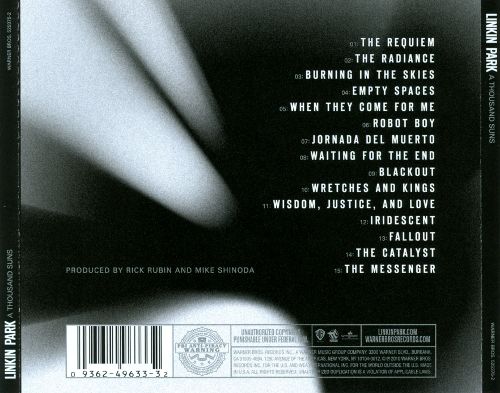Even at their critical low points, one thing you could never accuse multi-platinum rock band Linkin Park of was lacking ambition. While Hybrid Theory and Meteora may have defined modern rock in the early 2000’s, it was their evolution on subsequent albums that, while not always the most well-received, ensured the band was always adored by their fans. That’s also not including the fact that managing to incorporate new styles into their core sound was not an easy task to begin with, yet they never faded away like many of their peers.
It was on 2010’s A Thousand Suns that Linkin Park delivered arguably their most ambitious piece of work. Notably produced by the legendary Rick Rubin, it’s an exciting and diverse rock record that doesn’t get nearly enough love and attention – and we’re here to discuss why it’s worth your time and then some.
A foreword: This essay, written by Kris McGuire about A Thousand Suns, is worth a read for those who have the time. It essentially dissects the record and discusses the concept behind it, a true sociological analysis of what could be humanity’s downfall.
A Thousand Suns is, at its core, a sort of concept album about the possible downfall of humanity. That doesn’t mean the album can’t be enjoyed as individual songs rather than a whole piece of music, but A Thousand Suns is less about songs and more about the album itself as a whole. Of the album’s 15 tracks, just 9 are actual songs – the other 6 are interludes, though “Wisdom, Justice, And Love” fits well in particular, considering it’s a famous MLK Jr. speech.
Fans of singles-oriented music will be disappointed here. However, there’s not a shortage of highlights. Tracks like the poppy, upbeat “Waiting For The End” are unlike anything Linkin Park ever tried previously, almost sounding similar to a 311 track. Meanwhile, these lighter moments are juxtaposed and interwoven with Chester Bennington’s vocals, which are highlighted on the glitched out, heavy electronic rock of “Blackout”. To date, it’s arguably the most confident Chester ever sounded on a Linkin Park record.
There’s plenty of other highlights, too. The heavy electronic dub influence is front and center on “Wretches And Kings”, a strong contender for one of the overall best Linkin Park tracks period. Mike Shinoda is explosive on tracks like this and “When They Come For Me”, which at their best channel the original rap-rock pioneers like Public Enemy, Rage Against The Machine, and others in that time period. This isn’t even mentioning the big single here in “The Catalyst”, where Mike Shinoda and Chester Bennington really let loose with some of their best vocal tradeoffs to date. Overall, their blend of disparate influences has seen more critical praise in the years since its release than it may have garnered at first.
A Thousand Suns, for all its faults, is an ambitious record worth revisiting again. Listen to it with no pretensions, and you’ll find that it’s a record nobody ever expected Linkin Park to attempt. It’s experiments like these that kept Linkin Park evolving instead of trying to recreate previous work – and that’s why they’re one of the most popular and successful modern rock bands. Few bands of their genre ever tackled anything remotely ambitious quite like this, and that alone deserves praise – as well as for the execution.






More Stories
Linkin Park’s super heavy “QWERTY” has been unveiled to the world, and predictably, it’s going viral on social media
New Jersey indie rockers Real Estate bring a showcase of a set to Thalia Hall
Indie rockers Mannequin Pussy bring their unique mix of genres to Thalia Hall